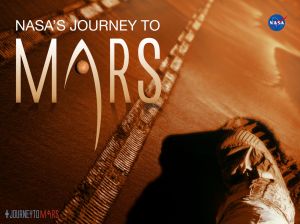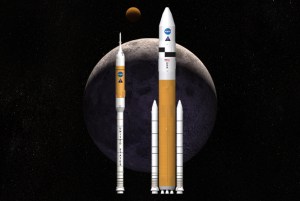President Obama released an op-ed on CNN today, praising the accomplishments of NASA to date and encouraging the nation to keep its sights set on Mars. While it was an inspiring endorsement for NASA and space exploration, it comes on the tails of a congressional bill intended to prevent the next presidential administration from changing NASA’s plan to send humans to Mars by the 2030’s.
The combination of these two events indicates that the current administration may be worried that the next presidential administration could ultimately choose to steer away from the Journey to Mars program that NASA has in place today.
With what happened to NASA’s Constellation program just six years ago, and the criticisms around NASA’s current Journey to Mars, their fears may be justified.

One of NASA’s many Journey to Mars campaign posters / Image courtesy of NASA
Just a few weeks ago, the Senate Commerce Committee, in an unprecedented move, passed a bill with language intended to prevent future changes to NASA’s strategy to send humans to Mars. Calling for continued development of NASA’s technologies required for a journey to Mars, the bill is expected to provide stability at NASA as the next president takes office.
The underlying implication is that the next administration could choose to cancel NASA’s Journey to Mars.
This type of drastic move wouldn’t be unprecedented.
Back when President Obama took office, NASA was focused on bringing humans to the moon – not Mars – in a program known as Constellation. Through the Constellation program, which began in 2004, NASA was developing two different rockets (Ares I and Ares V), the Orion crew capsule, and lunar lander technologies.

Artist rendering of NASA’s Ares I and Ares V rockets as part of the Constellation program / Image courtesy of NASA
But in 2010, after analysis of the program from leading space industry experts led the Office of Management in Budget to denounce Constellation as “over budget, behind schedule, and lacking in innovation,” President Obama cancelled the program along with the development of Ares I, Ares V, and the lunar landing technologies.
In passing the recent legislation, Senator Ted Cruz (R-Texas) who co-sponsored the bill, stated the importance of preventing another Constellation situation.
“The last NASA reauthorization act to pass Congress was in 2010. And we have seen in the past the importance of stability and predictability in NASA and space exploration – that whenever one has a change in administration, we have seen the chaos that can be caused by the cancellation of major programs. Whether it was the cancellation of the Constellation program, whether it was the cancellation of the space shuttle, the impact in terms of jobs lost, the impact in terms of money wasted has been significant.” Senator Ted Cruz
The bill itself isn’t legally binding, however. Changes in funding, technology breakthroughs or international developments could still alter NASA’s exploration plans at any point down the line.
It will eventually need to be passed by the House as well, but the bill does guarantee continued funding to specific programs within NASA’s Journey to Mars strategy including the Space Launch System (SLS) heavy-lift rocket, and the Orion crew capsule.
Perhaps the most important takeaway, though, is that the bill puts certain lawmakers on the Congressional record, stating they agree that major changes in NASA’s current Mars-bound exploration strategy would seriously damage the progress of the organization.
Senator Cruz, as well as the other senators who sponsored the bi-partisan bill, are certainly justified in worrying about potential changes to NASA with the changing administration. Not only because of what happened to Constellation, but because of the conversation around NASA’s very expensive SLS rocket.
NASA’s plan for SLS has endured its fair share of criticism over the years. Many have called the agency’s heavy-lift system the “Rocket to Nowhere,” citing the fact that it isn’t funded at a sustainable level, is already behind schedule, and has yet to have an agreed upon flight manifest.
These, of course, are many of the same criticisms leveled about the Constellation program that ultimately caused its demise.
On top of that, neither presidential candidate has clarified their stance on whether they believe we should send humans back to the Moon or focus on sending the first humans to Mars. So whether or not the next president even cares about sending humans to Mars is anyone’s educated guess.
Cancelling major programs like NASA’s Constellation or the Journey to Mars, after billions of taxpayer dollars have been invested, leads to obvious hardships – wasted time, wasted money and loss of American jobs to name a few.
But perhaps an even worse scenario is to invest in an exploration path, year after year, that will ultimately be too expensive to go anywhere. This mistake feeds into the common criticism that NASA is more of a “jobs program” than a results-driven organization.
Ultimately Congress has a decision to make. Do you want to go to Mars or not?
If Congress is going to compel the next administration to continue on NASA’s Journey to Mars, one thing is for sure: NASA’s budget will need to be raised. Otherwise, it may end up being another space program to nowhere.
